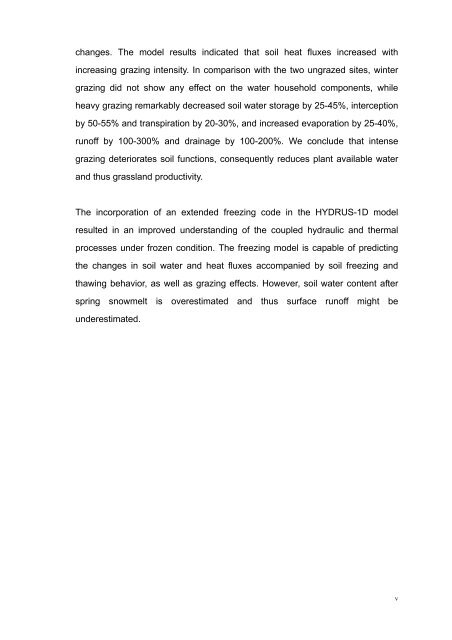- Page 1 and 2: SCHRIFTENREIHE Institut für Pflanz
- Page 3 and 4: Aus dem Institut für Pflanzenernä
- Page 5: I Table of contents I Table of cont
- Page 11 and 12: Zusammenfassung Überweidung wird a
- Page 13 and 14: Die Beweidung beieinflusst besonder
- Page 15 and 16: II List of figures Fig. 2.1. Locati
- Page 17 and 18: measured soil moisture in time stab
- Page 19 and 20: III List of tables Table 2.1. Descr
- Page 21 and 22: 1.1 Background Chapter 1 Introducti
- Page 23 and 24: Chapter 1 Introduction is also unce
- Page 25 and 26: Chapter 1 Introduction water in spr
- Page 27 and 28: Chapter 1 Introduction requires the
- Page 29 and 30: Chapter 1 Introduction Krümmelbein
- Page 31 and 32: Chapter 2 Spatial variability of so
- Page 33 and 34: Chapter 2 Spatial variability of so
- Page 35 and 36: Chapter 2 Spatial variability of so
- Page 37 and 38: Chapter 2 Spatial variability of so
- Page 39 and 40: Chapter 2 Spatial variability of so
- Page 41 and 42: Chapter 2 Spatial variability of so
- Page 43 and 44: Chapter 2 Spatial variability of so
- Page 45 and 46: Chapter 2 Spatial variability of so
- Page 47 and 48: Chapter 2 Spatial variability of so
- Page 49 and 50: Chapter 2 Spatial variability of so
- Page 51 and 52: Chapter 2 Spatial variability of so
- Page 53 and 54: Chapter 2 Spatial variability of so
- Page 55 and 56: Chapter 2 Spatial variability of so
- Page 57 and 58: Chapter 2 Spatial variability of so
- Page 59 and 60:
Chapter 3 Spatio-temporal variabili
- Page 61 and 62:
Chapter 3 Spatio-temporal variabili
- Page 63 and 64:
Chapter 3 Spatio-temporal variabili
- Page 65 and 66:
Chapter 3 Spatio-temporal variabili
- Page 67 and 68:
Chapter 3 Spatio-temporal variabili
- Page 69 and 70:
Chapter 3 Spatio-temporal variabili
- Page 71 and 72:
Chapter 3 Spatio-temporal variabili
- Page 73 and 74:
Chapter 3 Factors controlling spati
- Page 75 and 76:
Chapter 3 Factors controlling spati
- Page 77 and 78:
Chapter 3 Factors controlling spati
- Page 79 and 80:
Chapter 3 Factors controlling spati
- Page 81 and 82:
Chapter 3 Factors controlling spati
- Page 83 and 84:
Chapter 3 Factors controlling spati
- Page 85 and 86:
Chapter 4 Temporal stability of soi
- Page 87 and 88:
Chapter 4 Temporal stability of soi
- Page 89 and 90:
Y orientation Chapter 4 Temporal st
- Page 91 and 92:
Chapter 4 Temporal stability of soi
- Page 93 and 94:
MRD(%) MRD(%) 100 80 60 40 20 0 -20
- Page 95 and 96:
Chapter 4 Temporal stability of soi
- Page 97 and 98:
Chapter 4 Temporal stability of soi
- Page 99 and 100:
Chapter 4 Temporal stability of soi
- Page 101 and 102:
Soil water content (%) 40 30 20 10
- Page 103 and 104:
Chapter 4 Temporal stability of soi
- Page 105 and 106:
Chapter 5 Modeling Grazing Effects
- Page 107 and 108:
Chapter 5 Modeling Grazing Effects
- Page 109 and 110:
Chapter 5 Modeling Grazing Effects
- Page 111 and 112:
Chapter 5 Modeling Grazing Effects
- Page 113 and 114:
Chapter 5 Modeling Grazing Effects
- Page 115 and 116:
Chapter 5 Modeling Grazing Effects
- Page 117 and 118:
Chapter 5 Modeling Grazing Effects
- Page 119 and 120:
Chapter 5 Modeling Grazing Effects
- Page 121 and 122:
Chapter 5 Modeling Grazing Effects
- Page 123 and 124:
Chapter 5 Modeling Grazing Effects
- Page 125 and 126:
Chapter 5 Modeling Grazing Effects
- Page 127 and 128:
Chapter 5 Modeling Grazing Effects
- Page 129 and 130:
Chapter 5 Modeling Grazing Effects
- Page 131 and 132:
Chapter 5 Modeling Grazing Effects
- Page 133 and 134:
Chapter 5 Modeling Grazing Effects
- Page 135 and 136:
Chapter 6 Modeling of Coupled Water
- Page 137 and 138:
Chapter 6 Modeling of Coupled Water
- Page 139 and 140:
Chapter 6 Modeling of Coupled Water
- Page 141 and 142:
Chapter 6 Modeling of Coupled Water
- Page 143 and 144:
Chapter 6 Modeling of Coupled Water
- Page 145 and 146:
Chapter 6 Modeling of Coupled Water
- Page 147 and 148:
Chapter 6 Modeling of Coupled Water
- Page 149 and 150:
Chapter 6 Modeling of Coupled Water
- Page 151 and 152:
Chapter 6 Modeling of Coupled Water
- Page 153 and 154:
Chapter 6 Modeling of Coupled Water
- Page 155 and 156:
Chapter 6 Modeling of Coupled Water
- Page 157 and 158:
Chapter 6 Modeling of Coupled Water
- Page 159 and 160:
Chapter 7 General discussion and co
- Page 161 and 162:
Chapter 7 General discussion and co
- Page 163 and 164:
Chapter 7 General discussion and co
- Page 165 and 166:
Chapter 7 General discussion and co
- Page 167 and 168:
References Chapter 7 General discus
- Page 169 and 170:
Chapter 7 General discussion and co
- Page 171 and 172:
8. ACKNOWLEDGMENTS Firstly I would
- Page 173 and 174:
Curriculum Vitae M.Sc. Ying Zhao Of
- Page 175:
Schriftenreihe des Instituts Neuere


